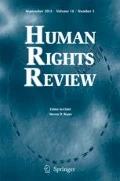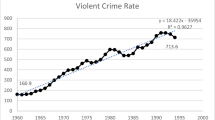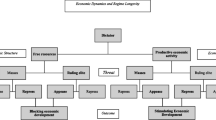Abstract
Recent judicial reforms after democratic transition have been substantial and relatively successful in Chile, but much less so in Argentina and Brazil. This article traces this variation in outcomes to the legal strategies of the prior authoritarian regimes. The Brazilian military regime of 1964–1985 was gradualist in its approach to the law, and had a high degree of civilian-military consensus in the legal sphere. It was not highly repressive in its deployment of lethal violence, and this combination of factors contributed to a gradualist and consensual transition in which judicial reform was not placed high on the political agenda. The Argentine case of military rule between 1976 and 1983 was almost the opposite. The military sidestepped and even attacked the judiciary, engaging in almost entirely extrajudicial violence. This generated a “backlash” reform movement after the transition to democracy that was mostly retrospective and only partially successful. In Chile, in contrast, the military engineered a radical break with previous legality, engaged in violent repression, but made considerable efforts to reconstruct a judicial order. It was in the aftermath of this situation that reformers were able to push through a prospective and relatively successful judicial reform. This article's findings suggest that judicial reform may be more likely to succeed where the prior authoritarian regime was both repressive and legalistic, as in Chile, Poland, and South Africa, than where high degrees of repression were applied largely extrajudicially, as in Argentina, Cambodia, and Guatemala, or where the authoritarian regime was legalistic but not highly repressive, as in Brazil, Mexico, and the Philippines.
Similar content being viewed by others
References
Agüero, Felipe. 2002. “Chile: Unfinished Transition and Increased Political Competition” in Jorge Domínguez and Michael Shifter, eds. Constructing Democratic Governance. Baltimore: Johns Hopkins University Press, forthcoming.
Argentine National Commission on the Disappeared. 1986 Nunca Más. New York: Farrar Straus and Giroux.
Barahone de Brito, Alexandra. 1997. Human Rights and Democratization in Latin America: Uruguay and Chile. New York: Oxford University Press.
Biebesheimer, Cristina and Francisco Mejía, eds. 2000. Justice Beyond Our Borders: Judicial Reforms for Latin America and the Caribbean. Washington D.C.: Inter-American Development Bank.
Boeninger, Edgardo. 1998. Democracia en Chile: Lecciones para la Gobernabilidad. Santiago: Editorial Andres Bello.
Dakolias, Maria. 1996. The Judicial Sector in Latin America and the Caribbean: Elements of Reform. Washington D.C.: World Bank Technical Paper Number 319.
Davis, Diane and Anthony Pereira, eds. 2003. Irregular Armed Forces and Their Role in Politics and State Formation. New York: Cambridge University Press.
Drake, Paul. 1996. Labor Movements and Dictatorships: The Southern Cone in Comparative Perspective. Baltimore: Johns Hopkins University Press.
Hammergren, Linn. 1998. The Politics of Justice and Justice Reform in Latin America. Boulder: Westview Press.
Hayner, Priscilla. 2001. Unspeakable Truths: Confronting State Terror and Atrocity. New York: Routledge.
Hilbink, Lisa. 2002. Review of William C. Prillaman, The Judiciary and Democratic Decay in Latin America: Declining Confidence in the Rule of Law. Princeton manuscript.
Mendez, Juan, Guillermo O'Donnell, and Paulo Sergio Pinheiro, eds. 1999. The (Un) Rule of Law and the Underprivileged in Latin America. Notre Dame, IN: University of Notre Dame Press.
Miranda, Nilmário and Carlos Tibúrcio. 1999. Dos Filhos Deste Solo (Mortos e Desaparecidos Políticos Durante a Ditadura Militar: A Responsibilidade do Estado). São Paulo: Editora Fundação Perseu Abramo/Boitempo Editorial.
National Commission on Truth and Reconciliation. 1993. Report of the Chilean National Commission on Truth and Reconciliation. University of Notre Dame Press.
Nino, Carlos. 1996. Radical Evil on Trial. New Haven: Yale University Press.
North, Douglass C. 1990. Institutions, Institutional Change and Economic Performance. New York: Cambridge University Press.
Popkin, Margaret. 2000. Peace Without Justice: Obstacles to Building the Rule of Law in El Salvador. University Park, PA: The Pennsylvania State University Press.
Prillaman, William C.. 2000. The Judiciary and Democratic Decay in Latin America: Declining Confidence in the Rule of Law. Westport: Praeger.
Rigby, Andrew. 2001. Justice and Reconciliation: After the Violence. Boulder: Lynne Rienner.
Rowat, Malcolm, Waleed Malik, and Maria Dakolias, eds. 1995. Judicial Reform in Latin America and the Caribbean: Proceedings of a World Bank Conference. Washington D.C.: World Bank Technical Paper Number 280.
Shklar, Judith. 1964. Legalism. Cambridge: Harvard University Press.
Stotzky, Irwin ed. 1993. Transition to Democracy in Latin America: The Role of the Judiciary. Boulder: Westview Press.
Ungar, Mark (2002). Elusive Reform: Democracy and the Rule of Law in Latin America. Boulder: Lynne Rienner Publishers.
Valenzuela Somarriva, Eugenio, ed. (1991) Proposiciones para la Reforma Judicial. Santiago: Centro de Estudios Publicos.
Rights and permissions
About this article
Cite this article
Pereira, A.W. Explaining judicial reform outcomes in new democracies: The importance of authoritarian legalism in Argentina, Brazil, and Chile. Hum Rights Rev 4, 3–16 (2003). https://doi.org/10.1007/s12142-003-1009-6
Issue Date:
DOI: https://doi.org/10.1007/s12142-003-1009-6




